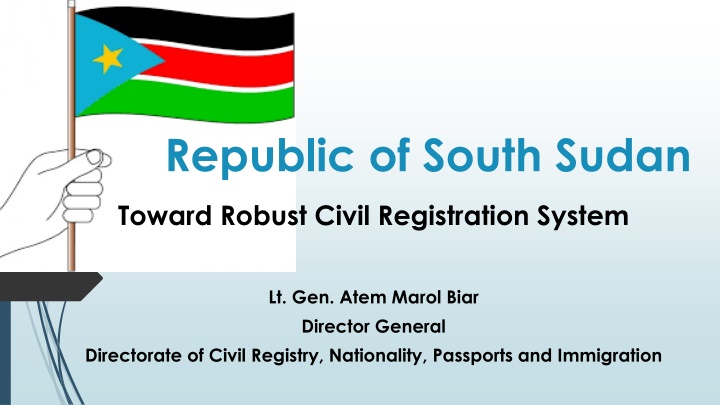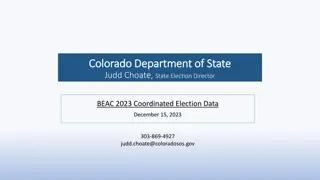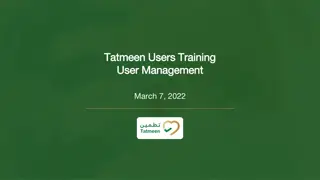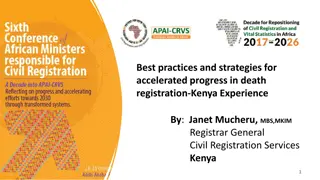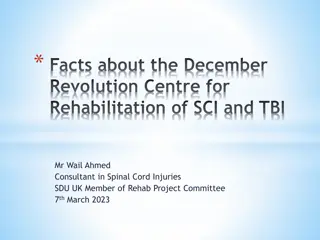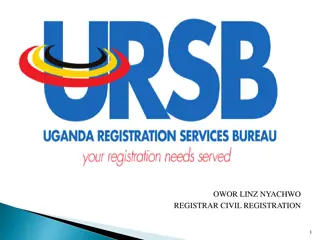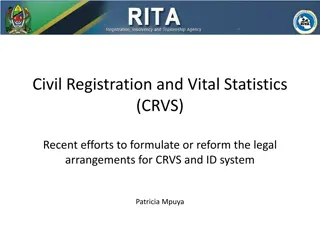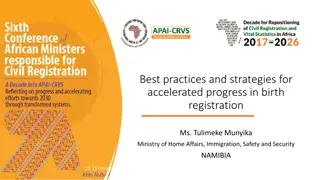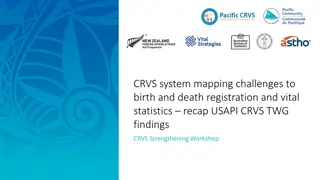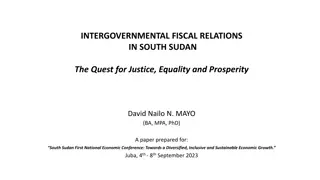Enhancing Civil Registration in South Sudan: Progress and Challenges
South Sudan is working towards establishing a robust civil registration system to effectively document vital events of its population. The government has made significant progress by implementing legal frameworks, launching the Civil Registry law, and participating in international conferences. However, challenges such as budget constraints, limited capacity, and inadequate ICT infrastructure hinder the full operationalization of the system.
Download Presentation

Please find below an Image/Link to download the presentation.
The content on the website is provided AS IS for your information and personal use only. It may not be sold, licensed, or shared on other websites without obtaining consent from the author.If you encounter any issues during the download, it is possible that the publisher has removed the file from their server.
You are allowed to download the files provided on this website for personal or commercial use, subject to the condition that they are used lawfully. All files are the property of their respective owners.
The content on the website is provided AS IS for your information and personal use only. It may not be sold, licensed, or shared on other websites without obtaining consent from the author.
E N D
Presentation Transcript
Republic of South Sudan Toward Robust Civil Registration System Lt. Gen. Atem Marol Biar Director General Directorate of Civil Registry, Nationality, Passports and Immigration
Background Republic of South Sudan gained independence in 2011. Population- 14,234,977 Languages- English, Arabic and Swahili with the East African Community integration agenda Ministry of Interior is the LEAD Government institution for Civil Registration- Directorate of Civil Registration, Nationality, Passport and Immigration (DCRNPI) Ministry of Health is a major player in the provision of vital events such as birth, death and causes of death.
Legal Framework in South Sudan for CRVS Transitional Constitutional 2011, as amended, Article 45. Nationality Act 2011, and its regulations 2011. Passports and Immigration Act, 2011, and its regulations. Civil Registry, Act 2018, regulations partially developed. Child Act, 2008.
Key Progress on CRVS In 2019, The President of the Republic of South Sudan launched the Civil Registry law, 2018 ( Political will). Establishment of Infrastructure (office space for HQs, and States) Formation of Technical Committee as a coordination Mechanism. 2011 to date- Ministry of Health to provides Birth notification to children, a key identify document to obtain nationality and passport Rapid assessment conducted by UNCEA on CRVS in September 2022 on the invitation of Government viewed as opportunity to determine status and gaps in CRVS.
Progress so.. International engagements- participated at 5 CRVS ministerial conferences ( South Africa, Ivory Coast, Mauritania, Zambia and Ethiopia) with complete composition of ministries of Interior, Health and National Bureau of Statistics Inter- Agency public consultation has been conducted, and strategic objectives identified. Partial development of Regulations on Identity Management
CHALLENGES Budgetary constraints as the operationalization of the Civil registry Act is delayed. lack of capacity (Institutional and personnel) . Limited ICT Infrastructure. Accessibility to remote areas of the country due to Mobility. Limited Coordination Mechanism among agencies with mandate on CRVS. Lack of harmonization of procedures across Government institutions.
Way Forward Strengthen the Interoperability with Health Sector. Harmonize procedures and requirement for civil registration. Operationalize civil registration in all the 10 states capital of South Sudan with immediate effect. Establish the advisory council for inter ministerial coordination as stipulate in the Law. Development partners to provide technical support to boost Government efforts.
Thank you! Shukran! Asante Sana! Merci !
ANY QUESTION!
